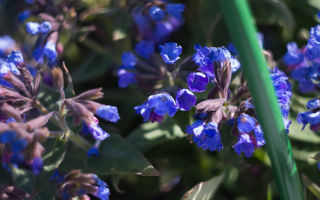Content
Lungwort (Pulmonaria officinalis) is a herbaceous perennial from the Burachnikov family. It is found in the forests of Europe, in the swamps of England, in Siberia and in the Kaliningrad region. Loves nutritious soils saturated with humus. The healing properties of lungwort have been known since ancient times. In Russia, the plant was used to treat pulmonary ailments, including tuberculosis. The oval-lanceolate leaves, covered with spots, resemble human lungs, which is why the people call it "pulmonary".
Its other names:
- water keys;
- spotted grass;
- forest spear;
- bear or bee grass.
Lungwort is grown to obtain valuable medicinal raw materials and as an excellent honey plant.
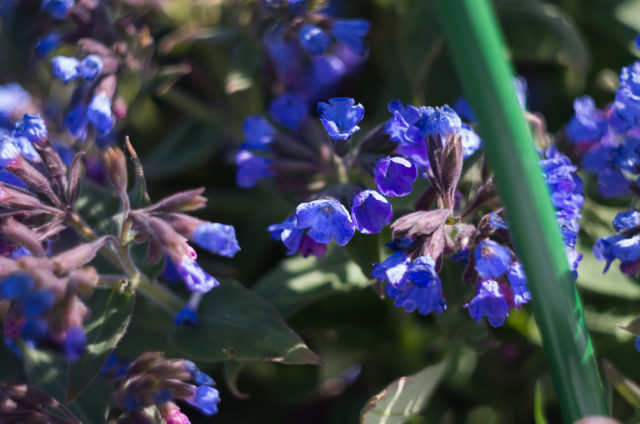
The chemical composition of lungwort
The benefits and harms of medicinal lungwort are determined by its chemical composition. Biologically active substances contained in the cells and sap of the plant have a beneficial effect on the human body, but at the same time they have a number of contraindications. The plant contains:
- saponins, flavonoids and tannins;
- alkaloid pyrrolizidine;
- vitamins C, P (rutin), B1, provitamin A;
- tannins and mucous substances that have a beneficial effect on the digestive tract;
- silicic acid, allantoin;
- trace elements - iodine, silicon, potassium, iron, silver, vanadium, nickel, strontium, copper, manganese.
Useful properties of lungwort
Due to the high content of saponins, tannins and mucous substances, Lungwort is excellent for treating bronchitis, asthma, tuberculous cough and other infectious lung diseases. It has pronounced expectorant and anti-inflammatory properties, helps the body to cope with the disease.
The plant has the following beneficial effects:
- stimulates blood circulation, cleanses the blood;
- effectively stops bleeding;
- has antioxidant properties, prevents the formation of benign and cancerous tumors;
- restores and strengthens the immune system;
- enhances the regenerative properties of cells;
- eliminates swelling, removes toxins and excess water from the body;
- has an analgesic effect;
- regulates metabolism;
- improves the condition of the skin, relieves itching, flaking, strengthens the hair follicles;
- has antibacterial and enveloping properties;
- promotes deep, restful sleep, relieves migraine attacks;
- increases the adaptive properties of the body, relieving stress symptoms;
- normalizes blood sugar.
For women, medicinal lungwort is an irreplaceable assistant, restoring hormones, curing diseases of the reproductive system. The course of treatment with this medicinal plant is indicated for men who have problems with potency.
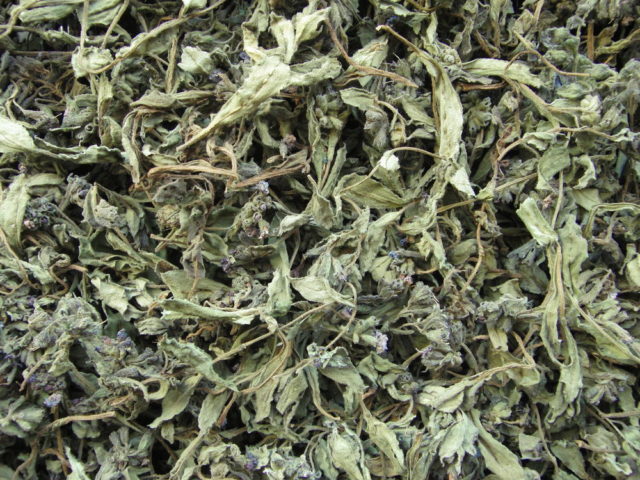
Lungwort harm
Providing a pronounced beneficial effect on the human body, if used improperly, the medicinal lungwort can cause significant damage. Exceeding the recommended doses, unauthorized violation of the duration and rules of admission, can cause the following symptoms:
- nausea and vomiting;
- increased blood clotting;
- blood clots;
- constipation, significant decrease in gastrointestinal muscle tone;
- allergic reactions in the form of urticaria, Quincke's edema.
It is necessary to use the plant for food in moderation.
Contraindications to lungwort
Medunitsa medicinal has the following contraindications:
- an individual allergic reaction to the substances contained in the plant;
- children under 6 years old;
- weakening of the smooth muscles of the intestines and stomach, caused by various diseases;
- a tendency to constipation;
- high blood clotting, thrombosis and thrombophlebitis;
- during pregnancy, breastfeeding the baby.
In adulthood, the use of this medicinal herb should be limited, while carefully monitoring the body's response. In the presence of chronic diseases of the CVS, gastrointestinal tract, it is necessary to consult with your doctor.
Rules for the use of lungwort
The medicinal properties of the herb of medicinal lungwort are fully revealed with proper use:
- from the collected raw materials, you can make alcoholic infusions, decoctions, squeeze juice;
- fresh leaves and thin stalks of lungwort are an excellent addition to the daily diet;
- the daily norm of a concentrated medicinal decoction or infusion for an adult is 40-60 ml;
- the broth should be consumed hot after meals, the tincture should be washed down with warm water, since cold water noticeably reduces the effectiveness of treatment.
For external use, the stems of a medicinal plant must be steamed or boiled. Apply as compresses, rinses and rinses. You can wipe problem areas with a swab soaked in the preparation.
The use of medicinal lungwort in folk medicine
Lungwort is often found in the recipes of healers and healers - in breast and intestinal preparations. Its pleasant sweet taste is especially popular with sick children. Medicines based on this perennial are indicated for the following ailments:
- lung diseases - tuberculosis, bronchitis, catarrh, debilitating dry cough, hoarseness;
- inflammation of the oral cavity - stomatitis, tonsillitis, tonsillitis;
- diabetes;
- wounds, bleeding, ulcers and rashes;
- loose, falling hair;
- fungal infections of the skin, mucous membranes;
- inflammatory processes in the gastrointestinal tract, prostate gland, rectum;
- urolithiasis and kidney inflammation;
- colitis, inflammation of the urinary tract;
- thyroid disease;
- vitamin deficiency, anemia, scurvy;
- leukemia, cancer, immune deficiency;
- disruption of the endocrine glands.
Periodic use of medicinal herbal brews helps to improve the work of internal organs, remove toxins and toxins, has a beneficial effect on the nervous system and the state of the body as a whole.
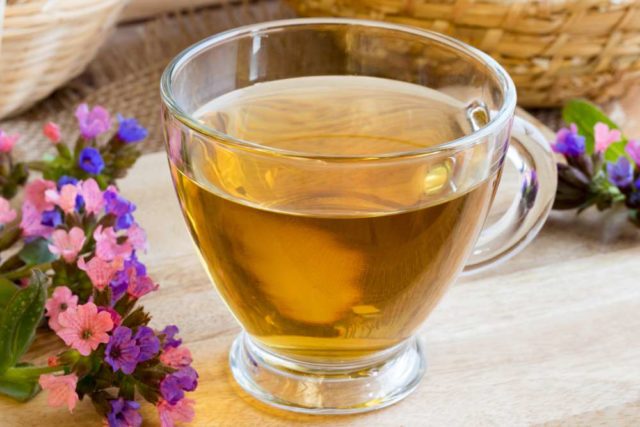
Lungwort during pregnancy
Care should be taken during pregnancy and breastfeeding.The use of any medications that contain lungwort should be discussed with the observing gynecologist, and then with the pediatrician. If there are no contraindications, then during the period of spring beriberi, you can use dried or fresh herb as a strengthening and restorative agent.
Collection and storage rules
Most often, lungwort can be found in mixed, humid forests, in clearings and clearings. Collect raw materials away from busy roads, landfills, factories and large cities, since the plant is capable of accumulating heavy metals and harmful substances from the air and soil. In spring and early summer, the aboveground parts are collected - the stem, inflorescences, leaves. In the fall, you can dig up the roots.
The cut stems are laid out on a linen or clean wooden surface in a thin layer, in a well-ventilated, shaded place, or suspended, tied in bunches. Medunitsa officinalis must be dried on the day of collection so that it does not have time to rot and turn black - such raw materials are unsuitable for use.
Peel the roots of the earth, rinse, cut into pieces. Dry them for a long time, in the fresh air or in a ventilated area, protected from the sun and insects.
Correctly dried lungwort has a light olive color and a subtle fresh aroma. You can store raw materials in wooden boxes, re-lined with clean wrapping paper, linen bags for 24 months. The room should be dry, well-ventilated and cool.
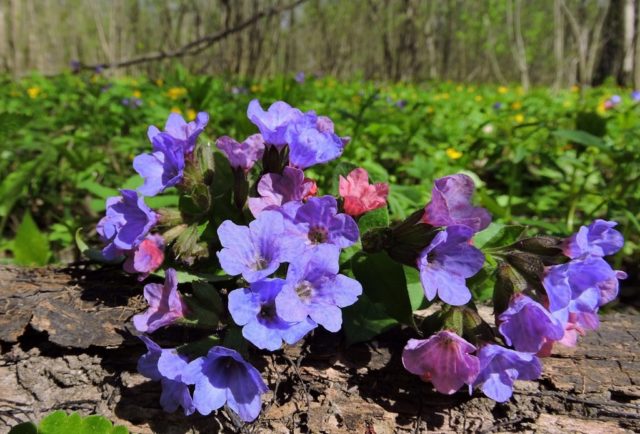
Photo of medicinal lungwort
In spring, in forest glades and meadows, low sprouts with lanceolate spotted leaves appear. In May, purple inflorescences-curls appear on the tops, which stand out brightly against a green background. Lungwort is full of extraordinary, fragile beauty.
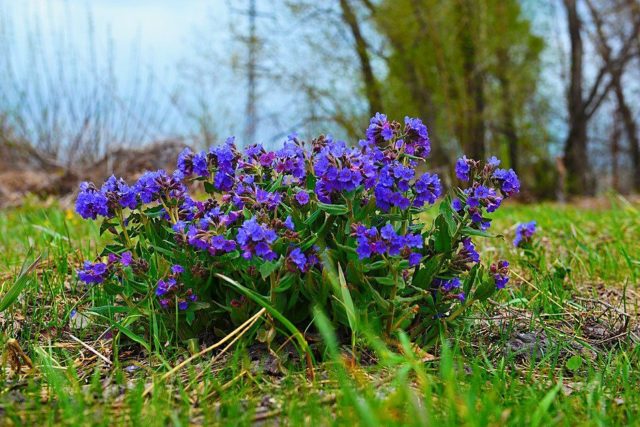
Conclusion
The healing properties of medicinal lungwort have been known since ancient times. It is used to treat various diseases of the respiratory, circulatory and genitourinary systems, as well as to restore a weakened body. Decoctions and compresses based on this perennial cope well with skin problems: fungus, inflammation, wounds, including purulent, eczema and abscesses. An excellent remedy for diarrhea, dysentery. In order for the treatment to be effective and not cause harm, it is necessary to adhere to the recommendations for use, as well as familiarize yourself with the list of contraindications. Collect herbs for medicinal raw materials and for salads should be in spring and early summer, during the period of growth and flowering. If the conditions are met, dried stems and roots can be stored for a long time without losing their medicinal properties.

